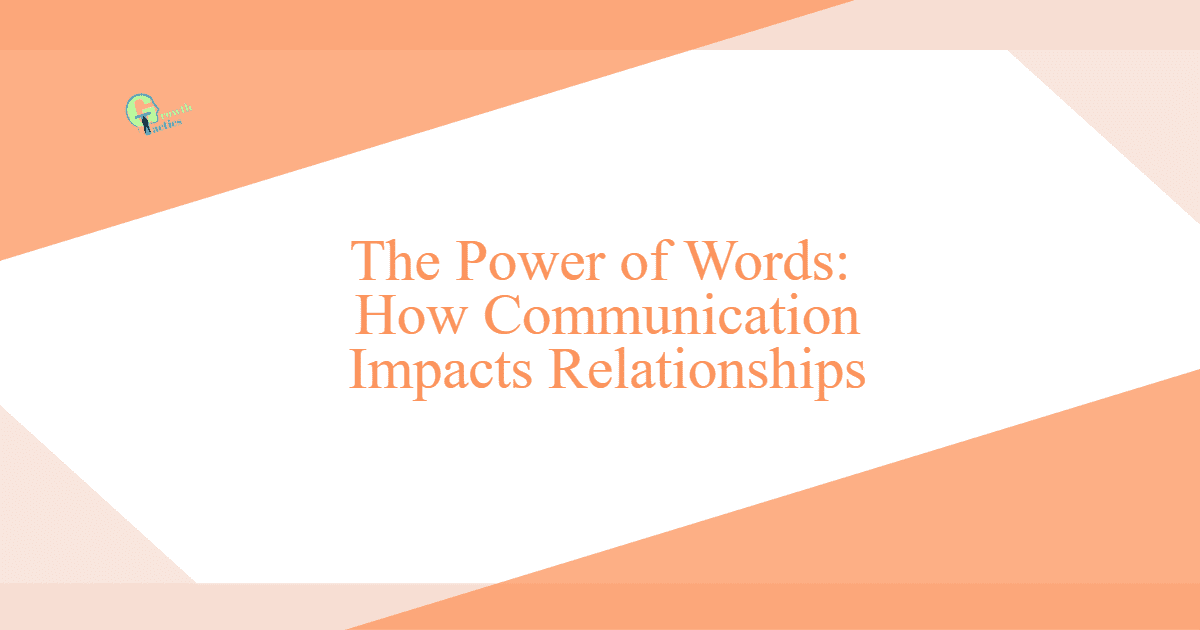Communication is a fundamental aspect of human interaction, and it plays a crucial role in the success and well-being of our relationships. Whether it’s a romantic partnership, a friendship, or a professional connection, the power of words and effective communication cannot be underestimated.
The way we communicate, both verbally and nonverbally, has a profound impact on the quality and satisfaction of our relationships. In this article, we will explore the various ways in which communication influences our relationships, the common communication issues that can arise, and strategies for improving communication skills to foster healthier and more fulfilling connections. Let’s delve into the power of words and how they shape our relationships.
Jump To Section
Types of Communication in Relationships
When it comes to communicating in relationships, there are various ways in which people can interact with each other. Effective communication is not limited to just verbal cues but also involves understanding body language, active listening, and empathy. Here are some of the most common types of communication in relationships.
Verbal Communication
Verbal communication is the most common form of communication in relationships and involves the use of words to express oneself. It includes speaking, tone of voice, choice of words, and the ability to actively listen to the other person. In romantic relationships, expressing love through words and affirming statements is important for maintaining intimacy and connection.
Nonverbal Communication
Nonverbal communication refers to the use of body language, gestures, and facial expressions to convey meaning. Research has shown that nonverbal communication often carries more weight than verbal communication and can significantly impact relationship satisfaction.
Unconscious body language cues can reveal emotions, intentions, and attitudes that are otherwise concealed by words.
Understanding the nuances of nonverbal communication can help individuals communicate more effectively in relationships. Examples of nonverbal communication include maintaining eye contact, mirroring body language, and using appropriate facial expressions.

The Effects of Communication on Relationships
Communication is a crucial part of any relationship. It can either enhance or hinder the quality of the relationship. Different communication styles can have varying effects on the dynamics of a relationship. Here are some of how communication impacts relationships:
1. Improved Understanding
Effective communication can enhance understanding between partners, leading to better relationships. When partners communicate effectively, they can express their needs, wants, and desires freely and in a non-threatening way. This can make each partner feel understood and valued by the other, leading to a stronger sense of connection.
2. Increased Trust
Communication is a key factor in building trust within a relationship. Being honest and forthcoming in communication can increase trust between partners. Conversely, a lack of communication or dishonest communication can create mistrust within a relationship.
3. Better Conflict Management
Effective communication can help resolve conflicts healthily. Couples who communicate well are often able to identify potential issues early on and discuss them before they become bigger problems. Partners who communicate well during disagreements may also be less likely to argue and are more likely to reach mutually acceptable solutions.
4. Decreased Emotional Distance
Effective communication can help reduce the emotional distance between partners. By expressing their feelings, partners may feel more connected to one another and the relationship. Additionally, showing empathy and active listening during communication can foster a secure attachment and reduce feelings of distance.
5. Increased Relationship Satisfaction
Effective communication can lead to an increase in relationship satisfaction for both partners. When each partner feels heard, understood, and valued by the other, they are likely to feel happier and more fulfilled in the relationship.
In conclusion, communication plays a significant role in the dynamics of a relationship. By improving communication skills, couples can strengthen their bond and work towards building a healthier relationship.

Common Communication Issues in Relationships
Communication is a vital aspect of any relationship, but it is not always smooth sailing. Many couples face common communication issues that can impact the quality and stability of their relationship. Being aware of these issues can help couples address and overcome them. Here are some of the most common communication problems in relationships:
1. Lack of Active Listening
One of the most prevalent communication issues is the failure to actively listen to your partner. Active listening involves paying full attention to the speaker, understanding their perspective, and responding in an engaged manner. Often, individuals become distracted, interrupt, or disregard their partner’s thoughts and feelings. This lack of active listening can lead to misunderstandings, resentment, and a communication breakdown.
2. Poor Timing and Delivery
How and when we communicate our thoughts and feelings can greatly impact the outcome of a conversation. Poor timing and delivery can cause defensive reactions and escalate conflicts. It is essential to choose an appropriate time and place for discussions and communicate calmly and constructively.
3. Ineffective Nonverbal Communication
Nonverbal cues, such as body language and tone of voice, can sometimes contradict the words we use. When nonverbal communication is incongruent with our verbal messages, it can create confusion and misinterpretation. Paying attention to nonverbal cues and ensuring they align with our intended message is crucial for effective communication.
4. Fear of Conflict or Avoidance
Many individuals in relationships tend to avoid conflicts or difficult conversations out of fear of upsetting their partner or damaging the relationship. However, avoiding or suppressing important issues can lead to pent-up frustrations, lack of resolution, and resentment. It is important to address concerns and disagreements respectfully and openly.
5. Lack of Emotional Expression
Emotional expression is a vital aspect of healthy communication in a relationship. Failing to express emotions, whether positive or negative, can lead to emotional distance or a sense of disconnection. It is crucial to create a safe and supportive environment where both partners feel comfortable sharing their feelings openly.
6. Assumptions and Mind Reading
Making assumptions about what our partner is thinking or expecting them to read our minds can lead to misunderstandings and frustration. It is important to communicate openly and clearly, without assuming the other person knows or understands our thoughts and needs.
Recognizing and addressing these common communication issues can pave the way for healthier, more effective communication in relationships. It requires both partners to actively listen, express themselves honestly, and be willing to work towards better communication skills. By doing so, couples can build stronger connections and resolve conflicts with greater understanding and empathy.

Improving Communication in Relationships
Strong and effective communication is the foundation of a healthy and fulfilling relationship. Fortunately, communication skills can be developed and improved with time and effort. Here are some tips for enhancing communication in your relationship:
1. Active Listening
Active listening involves fully focusing on your partner and understanding their perspective. Avoid interrupting or formulating responses in your head while your partner is speaking. Instead, listen attentively and seek clarification if needed. Show that you are engaged by making eye contact, nodding, and using affirming statements.
2. Express Thoughts and Feelings Clearly
Be open and direct in expressing your thoughts and feelings. Communicate your needs, desires, and concerns to your partner, using “I” statements to avoid sounding accusatory. Don’t assume your partner knows what you’re thinking; instead, share your thoughts openly and honestly.
3. Avoid Defensiveness and Criticism
It’s crucial to approach discussions without becoming defensive or criticizing your partner. Instead, focus on understanding their perspective and finding solutions together. Use non-blaming language and express yourself calmly and constructively. Remember that disagreements are natural, and it’s how you handle them that makes the difference.
4. Nonverbal Communication
Pay attention to your nonverbal cues when communicating with your partner. Maintain good eye contact, use open body language, and be aware of your tone of voice. Nonverbal signals can greatly affect how your message is received and interpreted, so ensure that they are in line with your intended message.
5. Practice Empathy and Understanding
Put yourself in your partner’s shoes and try to understand their perspective. Show empathy by acknowledging their feelings and validating their experiences. This creates a safer space for open and honest communication.
6. Use “We” Language
In discussions or problem-solving situations, use inclusive language that emphasizes collaboration and teamwork. Instead of focusing on individual grievances, frame the conversation in terms of shared goals and mutual growth.
7. Seek Professional Help if Needed
If you find that communication in your relationship is consistently challenging or causing significant distress, don’t hesitate to seek professional help. Relationship counseling or therapy can provide guidance and teach you valuable communication skills.
Improving communication in any relationship takes time and practice. By actively working on these tips and being mindful of your communication patterns, you can develop healthier and more effective communication with your partner. Remember, good communication is a continuous process that requires ongoing effort and a commitment to understanding and connecting with your partner.
Conclusion
Effective communication is essential for healthy relationships. It influences understanding, trust, conflict resolution, and emotional connection. However, common issues like poor listening, timing, nonverbal cues, fear of conflict, lack of emotional expression, and assumptions hinder effective communication. By improving active listening, clear expression, empathy, and nonverbal communication, couples can strengthen their bond and create a happier relationship.
Did you find this article on how communication impacts relationships useful? Don’t forget to share and subscribe below.








